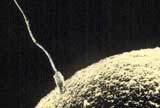Researchers discovered that acupuncture restores sperm motility. Laboratory experiments measured the effects of electroacupuncture on infertility by stimulating acupoints located on the scalp, abdomen and legs. The researchers measured “a trend of improved motility and increased number of motile epididymal spermatozoa in the H+EA (electroacupuncture) group.”
 Acupuncture for FertilityThe researchers note that electroacupuncture enhances “cell proliferation through improvement of Sertoli cell functions.” Sertoli cells are activated by follicle-stimulating hormone and are located in the convoluted seminiferous tubules, the anatomical structure in the testes where spermatozoa are produced.
Acupuncture for FertilityThe researchers note that electroacupuncture enhances “cell proliferation through improvement of Sertoli cell functions.” Sertoli cells are activated by follicle-stimulating hormone and are located in the convoluted seminiferous tubules, the anatomical structure in the testes where spermatozoa are produced.
Researchers disrupted spermatogenesis using a scrotal heat-treated rat model. Electroacupuncture was applied to GV20 (Baihui), CV4 (Guanyuan), ST36 (Zusanli) and SP6 (Sanyinjiao) for a total of ten acupuncture sessions. Seventy-nine days following the heat treatment, motile spermatozoa were found in the heat-treated group that received electroacupuncture. No motile spermatozoa were found in the rats that did not receive electroacupuncture. The electroacupuncture group also showed a significant increase in PCNA-positive cells and inhibin B levels. In addition, the electroacupuncture group demonstrated a higher Johnsen’s score through day 56. As a result of these finding, the researchers conclude that electroacupuncture “may facilitate the recovery of spermatogenesis and may restore normal semen parameters in subfertile patients.”
About the Healthcare Medicine Institute: HealthCMi provides online acupuncture CEUs to licensed acupuncturists and publishes news related to acupuncture, Chinese medicine and important innovations in healthcare technology.
References:
Electroacupuncture enhances spermatogenesis in rats after scrotal heat treatment. Volume 2, Issue 1. 3-2012. Pages 53 - 62. Jing Gao, Yan Zuo, Kam-Hei So, William S.B. Yeung, Ernest H.Y. Ng and Kai-Fai Lee.

